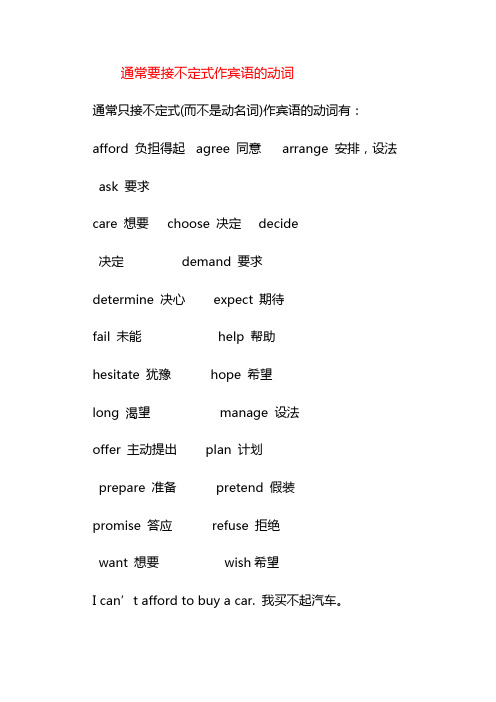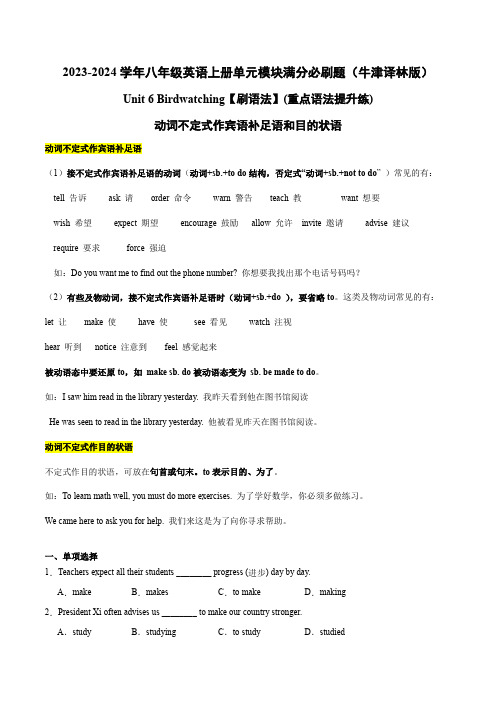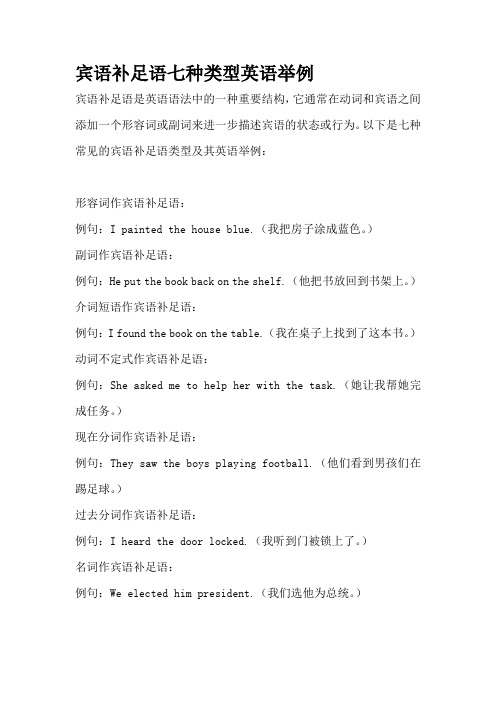动词不定式作宾语及宾语补足语
非谓语动词作定语和宾语补足语总结

非谓语动词作定语和宾语补足语总结非谓语动词是指不带有谓语成分的动词形式,包括动词不定式、动名词和现在分词、过去分词。
在句子中,非谓语动词可以用作定语和宾语补足语,用于修饰名词或补充说明动作的情况。
本文将对非谓语动词作定语和宾语补足语的用法进行总结。
一、非谓语动词作定语非谓语动词作定语时,通常与被修饰词之间存在逻辑上的主动或被动关系。
常见的用法有以下几种:1. 动词不定式作定语动词不定式作定语时,说明所修饰名词的用途、目的、结果等。
常见结构为“名词 + 不定式”,不定式可以是带to的原形,也可以是不带to的原形。
例如:- 他有个完全实现梦想的机会。
- 这个女孩太害羞了,从不和人交流。
2. 动名词作定语动名词作定语时,表示该名词的用途、目的、结果等。
常见结构为“动名词 + 名词”。
例如:- 听力训练是学习英语的重要环节。
- 这本书是关于如何提高写作技巧的。
3. 现在分词作定语现在分词作定语时,表示所修饰名词正在进行的动作或状态。
常见结构为“现在分词 + 名词”。
例如:- 拉着行李箱的女人是我的妈妈。
- 那个躺在床上的男孩是我的弟弟。
4. 过去分词作定语过去分词作定语时,表示所修饰名词已经完成的动作或状态。
常见结构为“过去分词 + 名词”。
例如:- 这本被翻阅过许多次的书籍是我的宝贝。
- 我看过的那部电影非常精彩。
二、非谓语动词作宾语补足语非谓语动词作宾语补足语时,用于补充说明宾语的动作或状态。
常见的用法有以下几种:1. 动词不定式作宾语补足语动词不定式作宾语补足语时,说明宾语完成的动作。
常见的结构为“动词 + 宾语 + 不定式”。
例如:- 我喜欢听音乐。
- 她希望学好英语。
2. 动名词作宾语补足语动名词作宾语补足语时,表示宾语的动作或状态。
常见结构为“动词 + 宾语 + 动名词”。
例如:- 我通常喜欢读书。
- 他不值得你浪费时间。
3. 现在分词作宾语补足语现在分词作宾语补足语时,表示宾语正在进行的动作。
动词不定式作宾语补足语的用法

动词不定式作宾语补足语的用法动词不定式是英语语法中的一种形式,它通常由“to”加上动词原形构成。
在英语句子中,动词不定式可以作为宾语的补足语,以完善或说明动词的含义。
在本文中,我们将探讨动词不定式作为宾语补足语的用法,并提供一些示例来帮助读者更好地理解。
一、动词不定式作宾语补足语的基本用法动词不定式作为宾语补足语,通常用于以下情况:1. 动词不定式作为及物动词的宾语补足语:例如:- She wants to learn how to play the guitar.(她想学习弹吉他。
)- He expects me to finish the report by tomorrow.(他期望我明天之前完成这份报告。
)2. 动词不定式作为使役动词的宾语补足语:例如:- My boss made me stay late to finish the project.(我的老板让我加班完成这个项目。
)- They had their car repaired at the garage.(他们把车拖到修车行修理了。
)3. 动词不定式作为感官动词的宾语补足语:例如:- I heard him sing at the concert.(我听到他在音乐会上唱歌。
)- She watched the children play in the park.(她看着孩子们在公园里玩耍。
)4. 动词不定式作为介词的宾语补足语:例如:- I am looking forward to seeing you tomorrow.(我期待明天见到你。
)- He is interested in learning Chinese culture.(他对学习中国文化感兴趣。
)二、动词不定式作宾语补足语的注意事项在使用动词不定式作为宾语补足语时,需注意以下几个方面:1. 动词不定式的位置:动词不定式通常置于及物动词之后作宾语补足语,或置于使役动词、感官动词、介词之后作宾语补足语。
不定式作宾语和宾补

通常要接不定式作宾语的动词通常只接不定式(而不是动名词)作宾语的动词有:afford 负担得起 agree 同意arrange 安排,设法ask 要求care 想要 choose 决定decide决定demand 要求determine 决心expect 期待fail 未能help 帮助hesitate 犹豫hope 希望long 渴望manage 设法offer 主动提出plan 计划prepare 准备pretend 假装promise 答应refuse 拒绝want 想要wish希望I can’t afford to buy a car. 我买不起汽车。
She refused to help me. 她不肯帮助我。
He agreed to come over right away. 他同意马上就来。
He managed to avoid an accident. 他设法避免了一次事故。
The boy decided not to become a sailor. 那孩子决定将来不当水手。
He chose not to go abroad until later. 他决定晚点出国。
He pretended not to know the facts. 他佯装不知实情。
“动词+宾语+不定式”用法说明可用于该结构的常用动词通常可带不定式作宾语补足语的动词:advise, allow, ask, bear, beg, cause, command, encourage, expect, forbid, force, get, hate, help, intend, invite, leave, like, mean, need, oblige, order, permit, persuade, prefer, request, remind, teach, tell, trouble, want, warn, wish等。
Unit6动词不定式作宾语补足语和目的状语-2023-2024学年八年级英语上册(牛津译林版)

2023-2024学年八年级英语上册单元模块满分必刷题(牛津译林版)Unit 6 Birdwatching【刷语法】(重点语法提升练)动词不定式作宾语补足语和目的状语动词不定式作宾语补足语(1)接不定式作宾语补足语的动词(动词+sb.+to do结构,否定式“动词+sb.+not to do” )常见的有:tell 告诉ask 请order 命令warn 警告teach 教want 想要wish 希望expect 期望encourage 鼓励allow 允许invite 邀请advise 建议require 要求force 强迫如:Do you want me to find out the phone number? 你想要我找出那个电话号码吗?(2)有些及物动词,接不定式作宾语补足语时(动词+sb.+do ),要省略to。
这类及物动词常见的有:let 让make 使have 使see 看见watch 注视hear 听到notice 注意到feel 感觉起来被动语态中要还原to,如make sb. do被动语态变为sb. be made to do。
如:I saw him read in the library yesterday. 我昨天看到他在图书馆阅读He was seen to read in the library yesterday. 他被看见昨天在图书馆阅读。
动词不定式作目的状语不定式作目的状语,可放在句首或句末。
to表示目的、为了。
如:To learn math well, you must do more exercises. 为了学好数学,你必须多做练习。
We came here to ask you for help. 我们来这是为了向你寻求帮助。
一、单项选择1.Teachers expect all their students ________ progress (进步) day by day.A.make B.makes C.to make D.making2.President Xi often advises us ________ to make our country stronger.A.study B.studying C.to study D.studied3.—Our English teacher asks us ________ English every day.—So my mother made me ________ the English text for half an hour yesterday evening.A.read; to read B.to read; to read C.to read; read4.There are many rules in Mary’s home. Her parents won’t allow her ________ out late.A.to stay B.staying C.stay D.stayed5.I see Tom ________ English almost every morning.A.reads B.read C.reading D.to read 6.Teachers always encourage their students ________ questions and discuss the answers.A.answer B.answers C.answering D.to answer 7.The workers in the nature park ask visitors not ________ the animals.A.feed B.to feed C.feeding D.fed8.My mother asks me ________ computer games before finishing my homework.A.not play B.to play C.not to play D.to not play 9.Evans had a sore throat (嗓子疼). His friend advised him ________ a doctor.A.seeing B.to see C.see D.sees10.—The doctor advised me ________ too much because it’s not good for my health.—The doctor is right. The less you drink, ________ you will be.A.don’t drink; the healthier B.not to drink; the healthierC.not to drink; the more healthier D.don’t drink; healthier11.Mrs. Smith made her daughter ________ for a long time.A.wait B.waited C.to wait D.waiting12.The old lady loves to watch the kids ________ basketball every evening.A.play B.played C.to play D.plays13.Our teacher tells us ________ in the street. It’s too dangerous.A.not play B.not playing C.not to play D.to not play 14.— Why is Nancy crying?— Because her mother forces her ________ her teeth twice a day.A.brush B.brushing C.to brush D.brushed15.We don’t allow ________ in the classroom, but we allow students ________ in the hallways.A.to sing; to sing B.singing; to sing C.to sing; singing16.I advise you ________ twice before ________ final decision.A.thinking, to make B.to think, make C.thinking, made D.to think, making 17.Lin Tao is hard-working. I often see him ________ English. Yesterday afternoon, when I passed the playground, I saw him ________ soccer.A.read; playing B.reads; played C.to read; play D.be reading; play18.Our teacher often encourages us _______ our dreams no matter what will happen.A.to give up B.not to give up C.not give up D.not giving up19.The teacher advised students ________ to music when doing homework because it would distract (分散) their attention.A.listen B.to listen C.not to listen D.to not listen20.Tom challenged his friend ________ chess.A.play B.playing C.to play D.to playing21.—Can the shelf be finished by the weekend?—Sure. ________ it on time, we will work two more hours a day.A.Completed B.Completing C.To complete D.Complete22.—________ more about tomorrow’s weather in Sheyang, please call 121.—OK, I will. Thank you.A.Know B.Knowing C.To know D.To knowing23.—What way can you think of ________ me improve my listening?—By listening to the tape more.A.helping B.to help C.help24.________ their health, students should exercise more.A.Improve B.To improve C.Improving D.Improved25.Hunters hunt tigers ________ their fur ________ make clothes.A.to; to B.for; to C.to; for D.for; for26.________ the work in time, they need to work two more hours a day.A.To finish B.To be finished C.Finish D.Finishing27.We should do what we can ________ the hunters ________ the animals.A.to prevent; killing B.to prevent; to kill C.prevent; killing D.prevent; to kill 28.healthy, you should eat more vegetables and less fast food.A.Keep B.To keep C.Keeping D.Kept29.—If you need my help, please let me know. I will do anything I can ________ you.—No, thanks. I can do it all by myself.A.to support B.support C.supporting D.supported30.—Wild animals are in danger. They need more people’s help.— Yes. People working in the reserves are doing everything they can ________ them.A.protect B.protecting C.to protect D.to protecting31.________ before training, we all arrive early every time.A.Warm up B.Warming up C.To warm up D.Warmed up32.________ their products more easily, many farmers put them online.A.Sell B.Selling C.To sell D.To selling33.—Peter’s mother gets up early ______ breakfast for him every morning.—Mother’s love is great.A.to make B.making C.make34.President Xi Jinping delivers a New Year address on Saturday evening, Dec 31, 2022, in Beijing ______ 2023.A.welcome B.welcoming C.welcomed D.to welcome35.Susan made some more dumplings ________ her friend a treat during the Spring Festival.A.gives B.giving C.to give D.give36.Shall we go to Lao She Teahouse ________ Beijing Opera?A.to enjoy B.enjoy C.enjoyed D.enjoys37.I’m not good at English. I will work hard ______ it.A.to improve B.improve C.to correct D.correct38.You should practise ______ more in order to ______ your written English.A.to write;improving B.writing;improvingC.writing;improve D.to write;improve39.Last weekend Peter went to the library ________ some books on music.A.borrow B.borrowed C.to borrow D.borrowing40.He ran into the room ________ the girl.A.save B.to save C.saves D.saved二、用所给单词的正确形式填空41.He tried everything (start) the car, but he didn’t make it.42.The doctor did what he could (help) the girl who was badly hurt in the accident. 43.He started a blog (share)his knowledge and connect with like-minded individuals. 44.The teachers send emails (tell) students something on holidays.45.(keep) healthy, you should take more exercise.46.(make) the salad look more colourful, I often mix different fruits together.47.Look! The teenagers are making cards (show) love for their mothers.48.I made a lot of money (help) the poor.49.They decide to do something (protect) the animals.50.All doctors did what they could (save) the people after the earthquake.51.My little son fell in love with chess and often challenged me (play) chess with him. 52.Let’s (glue)these pictures on the big paper.53.Sally invited me (come) to the party, but I forgot it.54.The World Wide Fund for Nature (WWF) chose the panda (be) its symbol. 55.Could you tell my father (call) me when he comes back?56.We often hear some students (practice) speaking English in the English corner. 57.He warns Tom (not make) the same mistake again.58.I would like you (meet) a friend of mine.59.I would like to help people (solve) problems.60.He ordered his men (run) fast.参考答案:1.C【详解】句意:老师们希望所有的学生都能一天比一天进步。
不定式做宾语、补足语。

不定式做宾语、补足语。
不定式在“主语+谓语+宾语+宾语补足语”句型中充当宾语补足语。
在这一句型中,宾语是动词不定式的逻辑主语。
1.再表示感觉的动词后面作宾语补足语,并且不定式都不带to.这一类动词有:see, hear, feel, watch, notice, observe, look at, listen to,等。
I here them sing yesterday.昨天我听见他们唱歌了。
Did you see him go out?你看见他们出去了吗。
I felt something crawl up my leg.我感到有什么东西爬道我腿上了。
2.在使役动词后作宾语补足语,不定式不带to.这一类动词有:make, let, have等。
转为被动语态时,其后通常都用带to的不定式(have没有被动语态)What would you have me do?你要我做什么?She made him give up smoking.她让他戒烟了。
Let him do whatever he whishes to do.他想干什么就让他干吧。
3.在表示心理状态的动词后作宾语补足语。
这类动词有:consider, think, believe, discover, find, imagine, judge,suppose, prove 等。
这类动词后的不定式通常是“to be+形容词或名词”结构,think,consider,find后的to be常可省略。
We consider him (to be) a good teacher.我们认为他是一个好老师。
He proved that theory (to be) very important.他证明那个理论是很重要的。
I thought her (to be) nice and honest the first time I met her.我第一次见到她的时候就认为她人很好,很诚实。
宾语补足语七种类型英语举例

宾语补足语七种类型英语举例
宾语补足语是英语语法中的一种重要结构,它通常在动词和宾语之间添加一个形容词或副词来进一步描述宾语的状态或行为。
以下是七种常见的宾语补足语类型及其英语举例:
形容词作宾语补足语:
例句:I painted the house blue.(我把房子涂成蓝色。
)
副词作宾语补足语:
例句:He put the book back on the shelf.(他把书放回到书架上。
)介词短语作宾语补足语:
例句:I found the book on the table.(我在桌子上找到了这本书。
)动词不定式作宾语补足语:
例句:She asked me to help her with the task.(她让我帮她完成任务。
)
现在分词作宾语补足语:
例句:They saw the boys playing football.(他们看到男孩们在踢足球。
)
过去分词作宾语补足语:
例句:I heard the door locked.(我听到门被锁上了。
)
名词作宾语补足语:
例句:We elected him president.(我们选他为总统。
)
这些是七种常见的宾语补足语类型,每种都有不同的用法和特点。
理解这些结构可以帮助更好地掌握英语语法。
动词不定式作宾语和宾语补足语

carefully.
3.Birds are never heard__t_o__s_i_n_g_(sing) here. 4.Did you notice him_n_o_t_i_c_e__(leave) the classroom?
•.
动词不定式 作宾语和宾语补足语
寺头中学 焦晓娜
.
动词不定式作宾语
We are planning to build another subway in Taiyuan.
I want to go home. want to do sth
plan to do sth
那么,哪些动词都能接不定式作宾语呢?
•.
make sb (not) do sth sb be made (not) to do sth
s young, I wished _t_o___b_e_(be)a policeman. 2.The teacher asked us t_o__c__o_p(cyopy) all the new words
•.
常用省to动词不定式作宾语补足语的动词有:
一感:feel 二听:listen to, hear 三使:make, let, have 四看:see,watch,look,notice
9动词非谓语动词动词不定式做宾语宾语补足语目的状语

喜欢/讨厌/开始/记得/忘记/停下来/努力/负担起/期 待
/拒绝/设法做成… like/hate/start/begin/remember/forget/stop/
try/afford/expect/refuse/manage to do sth
3. 用作宾语补足语:(v. + sb. + to do )
动词不定式
动词不定式的基本形式是“to+动词原形 “,`
在句中可以作主语、宾语、宾语补足语、定 语,状语,表语。
1.用作主语 (这时可将其用形式主语it来替换)
1.To be an actress is my dream. It is my dream to be an actress. 2. To go abroad is his dream. It is his dream to go abroad. 3. To say is easy, to do is difficult. It is easy to say, it is difficult to do.
When to start has not been decided. (主语)
I don’t know what to do. (宾语)
He can tell you where to get the book. (宾语补足语)
The question is how to solve the problem. (表语)
• 对我们来说,完成这项工作很困难。
• It’s difficult for us to finish the work.
用法: 2.用作宾语 (v. + to do ) I want to buy a computer. She hopes to find a better job.
- 1、下载文档前请自行甄别文档内容的完整性,平台不提供额外的编辑、内容补充、找答案等附加服务。
- 2、"仅部分预览"的文档,不可在线预览部分如存在完整性等问题,可反馈申请退款(可完整预览的文档不适用该条件!)。
- 3、如文档侵犯您的权益,请联系客服反馈,我们会尽快为您处理(人工客服工作时间:9:00-18:30)。
.
动词不定式作宾语及宾语补足语
1. 有些动词后面跟动词不定式与跟动名词作宾语表示不同的意义,常用的这类动词有mean, try, forget, remember等。
例如:
What do you mean to do with it?你打算把它怎样处理?〔mean指“打算〞〕
Missing the train means waiting for another hour. 要是误了火车,就得再等一个小时。
〔mean指“意味着〞〕
2. 感官动词see, hear, notice, observe, watch, feel, listen to, look at及使役动词make, have, let等后面常接不带to的动词不定式作宾语补足语,但这类动词用于被动构造〔have不用于被动构造〕时,那么不定式要带to。
例如:
We should make people who won’t work. →People who won’t work should be made to work.不肯工作的人要让他们工作。
3. 某些不能修饰人的形容词作宾语补足语时,不能用表示人的词作宾语,应用it作形式宾语,再用不定式的复合构造作真正的宾语;常用的这类形容词有necessary, easy, hard, common, possible 及impossible等。
例如:
译:生病使他不能去。
误:Illness made him impossible to go.
正:Illness made it impossible for him to go.
下载后可自行编辑修改,页脚下载后可删除。
